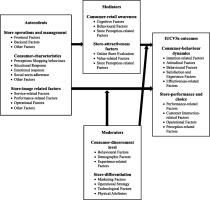Revolutionising retail: A review of Intelligent Unmanned Convenience Stores and their market implications
IF 13.3
1区 管理学
Q1 BUSINESS
Technological Forecasting and Social Change
Pub Date : 2025-07-21
DOI:10.1016/j.techfore.2025.124273
引用次数: 0
Abstract
Intelligent Unmanned Convenience Stores (IUCVSs, hereafter) introduce a fresh, intelligent service providing customers with an innovative shopping experience making use of technologies such as computer vision, Artificial Intelligence, automated payment systems, smart entry and exit systems, and more that eliminate lines and direct interaction with retail staff. This integrated suite of digital technologies functions as a silicon shopkeeper, automating the responsibilities typically carried out by human personnel in traditional convenience store operations. Although there has been a growing emphasis on research over the past decade, the literature concerning IUCVSs still lacks coherence, being dispersed across diverse contexts. Therefore, the current moment offers a favourable opportunity to evaluate the field by establishing the foundation for forthcoming research to delineate the extent of IUCVSs. The present research provides a glimpse into the existing body of literature examining consumer receptiveness to technological interfaces in retail as opposed to human interfaces by empirically investigating the emergence and growth of IUCVSs. Searching on SCOPUS and the Web of Science has yielded a final set of 106 articles relevant to IUCVSs. Therefore, by utilising the TCCM review framework, this study offers an in-depth understanding of the prevailing theories, countries shaping the contexts, the crucial variables as typical characteristics, and the various research approaches employed in IUCVSs research from 1996 to 2024. This study contributes to the existing literature by conducting a comprehensive review of these articles, a task previously unexplored by scholars, and presents an integrated conceptual framework for IUCVSs by amalgamating the insights gleaned from such studies. This study concludes by discussing various theoretical and managerial implications and suggesting potential avenues for future research directions using the TCCM framework.

零售业革命:智能无人便利店及其市场影响综述
智能无人便利店(以下简称IUCVSs)利用计算机视觉、人工智能、自动支付系统、智能出入口系统等技术,为顾客提供一种全新的智能服务,为顾客提供创新的购物体验,从而消除了排队和与零售人员的直接互动。这套集成的数字技术就像一个“硅掌柜”,将传统便利店中通常由人力完成的工作自动化。尽管在过去的十年中,人们越来越重视对IUCVSs的研究,但关于IUCVSs的文献仍然缺乏连贯性,分散在不同的背景中。因此,当前时刻提供了一个有利的机会,通过为即将开展的研究奠定基础来评估该领域,以描绘IUCVSs的范围。本研究通过实证研究IUCVSs的出现和增长,提供了对现有文献的一瞥,这些文献考察了消费者对零售中技术界面的接受程度,而不是人类界面。在SCOPUS和Web of Science上搜索,最终得到了106篇与iucvs相关的文章。因此,本研究利用TCCM回顾框架,对1996年至2024年IUCVSs研究的主流理论、形成背景的国家、作为典型特征的关键变量以及采用的各种研究方法进行了深入了解。本研究通过对这些文章进行全面的回顾,为现有文献做出了贡献,这是学者们以前从未探索过的任务,并通过整合从这些研究中收集到的见解,为IUCVSs提出了一个综合的概念框架。本研究最后讨论了运用TCCM框架的各种理论和管理意义,并提出了未来研究方向的潜在途径。
本文章由计算机程序翻译,如有差异,请以英文原文为准。
求助全文
约1分钟内获得全文
求助全文
来源期刊
CiteScore
21.30
自引率
10.80%
发文量
813
期刊介绍:
Technological Forecasting and Social Change is a prominent platform for individuals engaged in the methodology and application of technological forecasting and future studies as planning tools, exploring the interconnectedness of social, environmental, and technological factors.
In addition to serving as a key forum for these discussions, we offer numerous benefits for authors, including complimentary PDFs, a generous copyright policy, exclusive discounts on Elsevier publications, and more.

 求助内容:
求助内容: 应助结果提醒方式:
应助结果提醒方式:


